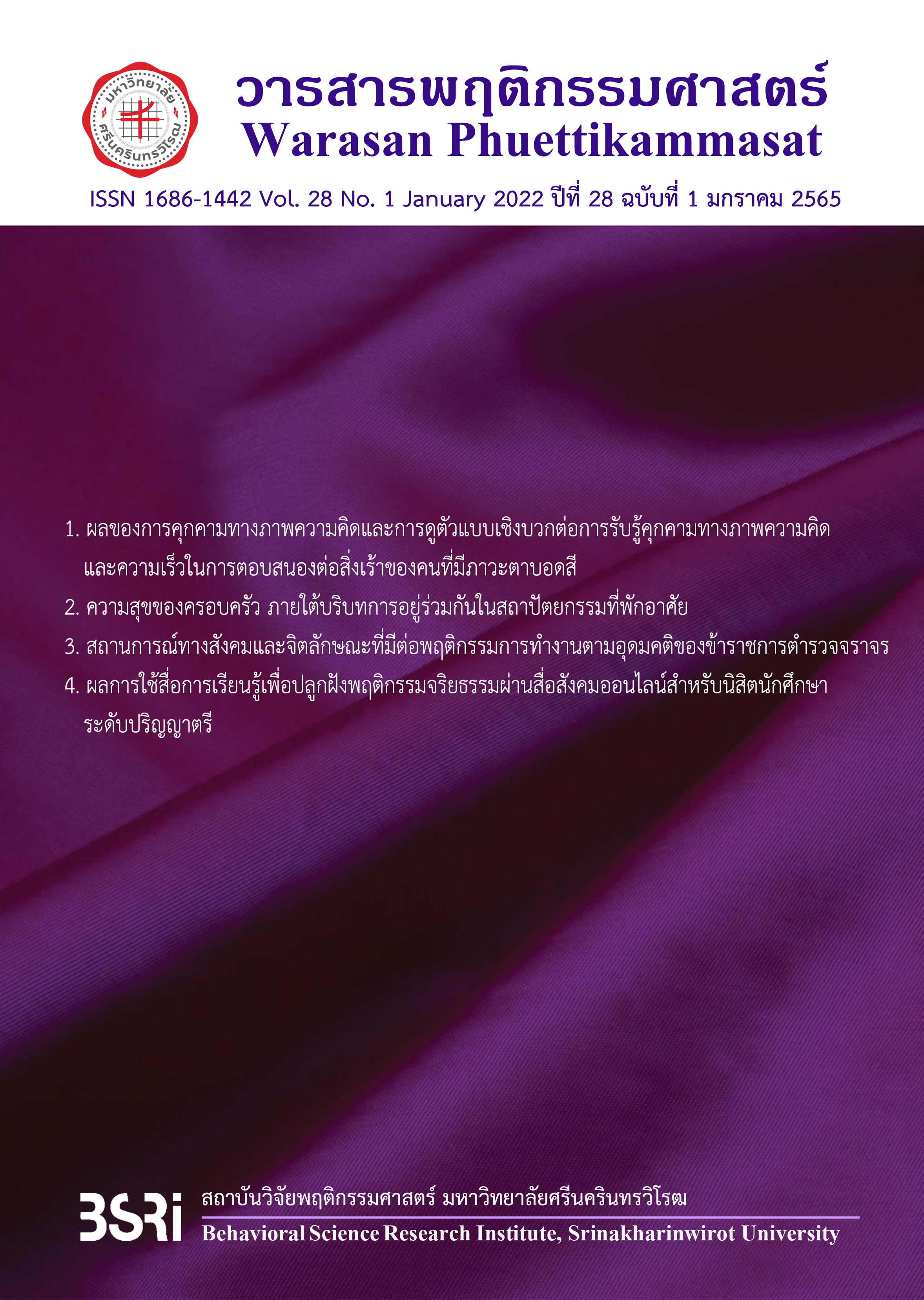The Effects of Instructional Media to Cultivate Moral Behavior through Social Media for Undergraduate students
Keywords:
instructional media, moral cultivation, undergraduate students, social mediaAbstract
This research aims to compare psychological characteristics and moral behavior among undergraduate students who were taught using the above method and those who studied traditional ethical and moral courses. The sample consisted of 200 undergraduate students of Srinakharinwirot University in the academic year 2019. Effectiveness testing was performed by dividing a sample of 74 undergraduate students into three groups: individual testing, group testing and field testing, consisting of 5, 15 and 54 members, respectively. To study the results, a sample of 200 undergraduate students was divided into 3 groups: Experimental Group 1, Experimental Group, and Control Group. The research instruments consisted of the moral reasoning test (α = 0.98), attitudes towards moral behavior scale (α = 0.94), and moral behavior scale (α = 0.92). The data were statistically analyzed by using Multivariate Analysis of Covariance (MANCOVA). The results showed Learning Outcomes of Experimental Group were according to the learning management plan; that on attitudes towards moral behavior, Experimental Group 1 and Experimental Group 2 each had significantly different average scores from the Control Group at a significance level of .05. Only Experimental Group 1 had a significantly different average score on moral reasoning from the Control Group at a significance level of .05; and the average scores on moral behavior of each of the three groups were not significantly different at a significance level of .05. Moreover, this media is used in instruction or activities to promote ethical behaviors for young people in society.
Downloads
References
Bandura, A. (1989). Social Cognitive Theory. In Annals of Child Development (Vol. 6, pp. 1-60). JAI Press.
Bhanthumnavin, D. (2001). thritsadī tonmai čhariyatham: kānwičhai læ kānphatthanā bukkhon [The Ethical Tree Theory: Research and Personal Development]. National Institute of Development Administration.
Bhanthumnavin, D. (2008). Kān sangkhro̜ ngānwičhai kīeokap khunnatham čhariyatham nai prathēt Thai læ tāngprathēt [Synthesis of Research on Moral and Ethics in Thailand and Foreign Country]. Moral Promotion Center.
Boonaree, S. (2003). phonkān fưk khwāmsāmāt dān kān rūkhit læ khwāmsāmāt dān kānchai hētphon chœ̄ng čhariyatham thī mī tō̜ thatsanakhati tō̜ phrưttikam čhariyatham khō̜ng naksưksā [The effect of Training of Cognitive Ability and Moral Reasoning on Attitude towards Moral Behavior of Students]. Ubon Ratchathani Rajabhat Institute.
Chaiyaratana, C., & Pakdeto, R. (2018). phon khō̜ng kānsō̜n dōi chai sathānakān phān sư̄ kānrīanrū ʻīlœ̄nning tō̜ kānchai hētphon chœ̄ng čhariyatham læ thatsanakhati chœ̄ng čhariyatham khō̜ng naksưksā phayābān [The effects of e-leaning toward the moral reasoning and ethical attitude of student nurses]. Thai Red Cross Nursing Journal, 11(2), 204-218.
Darzia, N. (2013). Moral Motivation Moral Judgment and Antisocial Behavior. Journal of Research in Character Education, 9(2), 149-161.
Haddock, G.; & Maio, G. R. (2015). Attitudes. In Hewstone, M., Stroebe, W., & Jonas, K. (Eds.). Social Psychology (6th ed., pp. 171-201). Wiley.
Kalaitzidis E., & Schmitz, K. (2012). A study of an ethics education topic for undergraduate nursing students. Nurse Education Today, 32(1), 111-115.
Kanjanakaroon, J. (2009). khunnatham čhariyatham læ kānchai hētphon chœ̄ng čhariyatham khō̜ng naksưksā mahāwitthayālai thēknōlōyīphračhō̜mklao Thon Burī [Virtue, Morality and Moral Reasoning of KMUTT’s Students]. Saengtham College Journal, 1(1), 96-109.
Khotrakun, S. (1998). Educational Psychology. Chulalongkorn university press.
Kohlberg, L. (1976). Moral stages and moralization: The cognitive development Approach. Rineheart and Winston.
Krcmar, M., & Locke, S. (2020). Media Use and the Development of Moral Reasoning. In The International Encyclopedia of Media Psychology.
Kunarak, K. (2016). kānphatthanā laksūt rāiwichā čhariyatham læ thaksa chīwit samrap naksưksā parinyā trī Khana Sưksāsāt [The development of ethic and life skills curriculum for undergraduate students in the faculty of education]. Veridian E-Journal, Silpakorn University (Humanities, Social Sciences, and Arts), 9(2), 1847-1859.
National Moral Promotion Committee. (2018). kān songsœ̄m khunnatham phō̜phīang winai sutčharit čhit ʻāsā [Moralities promoting: sufficiency, discipling, integrity, public mind]. Moral promotion center (Public Organization).
Office of knowledge management and development. (2017). sēn kānrīanrū khō̜ng khon run mai nai yuk dičhithan [Learning trends of the new generation in the digital age]. http://www.okmd.or.th/okmd-opportunity/FutureLearningPlatform/899/Digilearn_infographic
Pinpradit, N. (2012). čhariyatham: thritsadī læ rūpbǣp kānphatthanā [Ethics: Theory and Model Development]. Khon Kaen University.
Quimson, L. O. (2020). A descriptive study on the effects of social media on the moral development of the young people. International Journal of Research Studies in Education, 9(7), 45-54.
Royal Thai Government Gazette. (2020). prakāt sathānkān chukchœ̄n nai thuk khēt thō̜ngthī thūa rātchaʻānāčhak [Emergency Declaration in all areas of the kingdom]. http://www.ratchakitcha.soc.go.th/DATA/PDF/2563/E/069/T_0001.PDF
Srinakharinwirot University. (2020). Prakāt Mahāwitthayālai Sīnakharinwirōt rư̄ang māttrakān pō̜ngkan kān phrǣ rabāt khō̜ng chư̄arōk COVID-19 chabap thī 2 [Announcement of Srinakharinwirot University on measures to prevent the epidemic (COVID 19) Vol. 2]. https://covid19.swu.ac.th/archives/11
Sriplung, P., & Hoksuwan, P. (2015). kānsưksā phư̄a phatthanā čhariyatham khō̜ng nakrīan dūai krabūankān ʻaphi panyā [A study for developing ethics of students through the use of metacognition]. Nakhon Phanom University Journal, 5(2), 7-16.
Watts, L. L., Medeiros, K. E., Mulhearn, T. J., Steele, L. M., Connelly, S., & Mumford, M. D. (2017). Are Ethics Training Programs Improving? A Meta-Analytic Review of Past and Present Ethics Instruction in the Sciences. Ethics & behavior, 27(5), 351–384. https://doi.org/10.1080/10508422.2016.1182025
Watts, L. L., Todd, E. M., Mulhearn, T. J., Medeiros, K. E., Mumford, M. D., & Connelly, S. (2016). Qualitative Evaluation Methods in Ethics Education: A Systematic Review and Analysis of Best Practices. Accountability in Research, 24(4), 225–242. doi:10.1080/08989621.2016.1274975
Zhao, Y., & Ding, T. (2018). Effects of Digital Game-Based Experiential Learning on Students’ Ethical Instruction Effectiveness. Eurasia Journal of Mathematics, Science and Technology Education, 14(7), 3347-3354. https://doi.org/10.29333/ejmste/91243
Downloads
Published
How to Cite
Issue
Section
License
Copyright (c) 2022 Warasan Phuettikammasat

This work is licensed under a Creative Commons Attribution-NonCommercial-NoDerivatives 4.0 International License.
Behavioral Science Research Institute, SWU
114 Sukhumvit 23, Bangkok 10110, Thailand.
Tel.02-649-5000 # 17600



